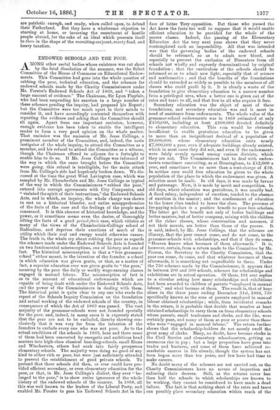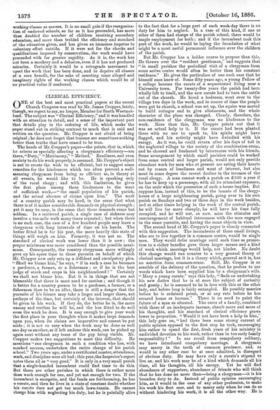ENDOWED SCHOOLS AND THE POOR.
AMONG other useful bodies whose existence was cut short by the fatal dissolution of the summer, was the Select Committee of the House of Commons on Educational Endow- ments. This Committee had gone into the whole question of robbing the poor, technical education, and the schemes for endowed schools made by the Charity Commissioners under Mr. Forster's Endowed Schools Act of 1869, and "taken a large amount of evidence." The Chairman, Sir Lyon Playfair, who had been suspending his sanction to a large number of these schemes pending the inquiry, had prepared his Report ; but the Committee were too much upset in their minds to consider it, and have accordingly contented themselves with reporting the evidence and asking that the Committee should sit again. Apart from one important omission, however, enough evidence has been taken to enable the intelligent reader to form a very good opinion on the whole matter. That omission was the omission of Mr. Jesse Collings, a prominent member of the Committee, and, indeed, the main instigator of the whole inquiry, to attend the Committee as a member, and his refusal to attend the Committee as a witness, though the Chairman offered to adjourn for a fortnight to enable him to do so. If Mr. Jesse Collings was informed of the way in which the cases brought before the Committee were going, this refusal is intelligible, for the main attack from Mr. Collings's side had hopelessly broken down. We dis- cussed at the time the great West Lavington case, which was sampled by Mr. Chamberlain and Mr. Jesse Collings as typical of the way in which the Commissioners "robbed the poor," entered into corrupt agreements with City Companies, and "violated the spirit of their instructions," the Endowed Schools Acts, and in which, on inquiry, the whole charge was shown to rest on a historical blunder, and entire misapprehension of the facts of the case and the feelings of the people most concerned. It is this absence of historical knowledge, and the power, or it sometimes seems even the desire, of thoroughly sifting the facts of a good primel-facie case, which vitiates so many of the views of the Chamberlain-Collings school of Radicalism, and deprives their exertions of much of the utility which their zeal and energy would otherwise ensure. The truth is, the whole cry about robbing the poor as regards the schemes made under the Endowed Schools Acts is founded on two fundamental misconceptions, one of history and one of fact. The historical misconception is that a "free grammar- school" either meant, in the intention of the founder, a school in which education was given gratis, or that, as a matter of fact, a superior education ever was given gratis to "the poor," meaning by the poor the daily or weekly wage-earning classes engaged in manual labour. The misconception of fact is as to the amount of educational endowments which are capable of being dealt with under the Endowed Schools Acts, and the power of the Commissioners in dealing with them. The historical point is quite clear to any one who reads the report of the Schools Inquiry Commission on the foundation and actual working of the endowed schools of the country, in consequence of which the Act of 1869 was passed. The vast majority of the grammar-schools were not founded specially for the poor, and, indeed, in many cases it is expressly stated that the poor are not to be excluded, thereby showing con- clusively that it was very far from the intention of the founders to exclude every one who was not poor. As to the actual conditions of the schools in 1869, here and there some of them had been converted by energetic and ambitious head masters into high-class classical boarding-schools, small Etons and Winchesters, others bad sunk into fairly prosperous elementary schools. The majority were doing no good of any
kind to either rich or poor, but were just sufficiently attended to prevent the establishment of good private schools. To pretend that these schools did then, or ever could have pro- vided efficient secondary, or even elementary education for the poor, or that, in Mr. Jesse Collings's dialect, they ever "be- longed to the poor," is to show entire ignorance of the whole history of the endowed schools of the country. In 1868, all this was well known to the leaders of the Liberal Party, and enabled Mr. Forster to pass his Endowed Schools Act in the face of bitter Tory opposition. But those who passed the Act knew the facts too well to suppose that it would enable efficient education to be provided for the whole of the poorer classes. Indeed, the passing of the Elementary Education Act the very next year shows that they never contemplated such an impossibility. All that was intended was that the governing bodies of the endowed schools should be reformed, so as to admit new blood, and especially to prevent the exclusion of Dissenters from all schools not wholly and expressly denominational by original foundation ; that the curriculum of the schools should be reformed so as to admit new light, especially that of science and mathematics ; and that the benefits of the foundations should be extended as widely as possible to the members of all classes who could profit by it. It is clearly a waste of the foundation to give elementary education to a narrow number from a privileged area, when a better one is given out of the rates and taxes to all, and that free to all who require it free.
Secondary education was the object of most of these foundations, and secondary education was and is most in need of assistance from endowments. The whole value of the grammar-school endowments was in 1868 estimated at only £450,000, including at least £100,000 devoted definitely to elementary education. This sum would be obviously insufficient to enable gratuitous education to be given to more than an insignificant decimal of a population of 28,000,000, whose elementary education costs nearly £7,000,000 a year, even if adequate buildings already existed, which in most cases they did not, and even if the endowments were fairly evenly spread among various districts, which they are not. The Commissioners had to deal with endow- ments sometimes amounting, as at Birmingham to £12,000 a year, and sometimes to no more than a rent-Charge of £10. in neither case could free education be given to the whole population of the place to which the endowment was given. A selection must be made. In old days, it was made by favour and patronage. Now, it is made by merit and competition. In old days, where education was gratuitous, it was usually bad. A fixed salary, independent of exertion, tended to the absence of exertion in the master; and the confinement of education to the lower class tended to lower the class. The presence of fee-paying scholars is a positive benefit to poor free scholars. The latter get the benefit not only of better buildings and better masters, but of better company, mixing with the children of the richer classes, whose conversation and manners, if not their morals, are better than those of the poorer. It is said, indeed, by Mr. Jesse Collings, that the schemes are illusory, that the poor cannot come, and do not come, to the grammar-schools with scholarships, and that if they do come, "Heaven knows what becomes of them afterwards." It is, however, certain, from a return made to the Committee by Mr. Fearon, the Secretary to the Charity Commission, that the poor can come, do come, and that whatever becomes of them afterwards, it is something not unprofitable to them. Under the 750 schemes made by the Commissioners, it appears that in between 200 and 300 schools, schemes for scholarships and exhibitions are in actual operation. Of these, 101 sent replies to a circular asking how many scholarships and exhibitions had been awarded to children of parents "employed in manual labour," and what became of them. The result is, that of boys alone in the three years ending December 31st, 1884, 739 specifically known as the sons of parents employed in manual labour obtained scholarships ; while, from incidental remarks in the return, it is probable that double that number at least obtained scholarships to carry them on from elementary schools whose parents, small tradesmen and clerks, and the like, were certainly poor, and many of them as poor or poorer than those who were "engaged in manual labour." The return further shows that the scholarship-holders do not merely swell the great army of clerks. Many, no doubt, have become clerks in the Civil Service and elementary schoolmasters, getting an
enormous rise in pay ; but a large proportion have gone into trades and business, and some of them have achieved re- markable success in life already, though the system has not been begun more than ten years, and few have had time- to make careers.
No doubt many of the schemes are not carried out, as the Charity Commissioners have no means of inspection and enforcing their decrees. Still, as the returns cover less than half the schools in which scholarships are known to be working, they cannot be considered to have made a dead failure. The fact is that nothing short of the rates and taxes can possibly place secondary education within reach of the working classes as masses. It is no small gain if the reorganisa- tion of endowed schools, so far as it has proceeded, has more than doubled the number of children receiving secondary education, and more than trebled the efficiency and standard of the education given, and has given an immense impetus to voluntary effort outside. If it were not for the checks and qualifications imposed by conservatism, the work would have proceeded with far greater rapidity. As it is, the work has not been a mockery and a delusion, even if it has not produced miracles. Certainly it would be a retrograde movement to upset the work that has been done, and to deprive all classes of a sure benefit, for the sake of asserting some alleged and imaginary rights of the working classes which would be of no practical value if conferred.



































 Previous page
Previous page